Starbucks Marketing: Strategies, Competition, and Sustainability
VerifiedAdded on 2023/04/21
|16
|1835
|477
Presentation
AI Summary
This presentation provides a detailed overview of Starbucks' marketing strategies, beginning with an introduction to the company and its global presence. It delves into market segmentation based on demographics and psychographics, followed by a SWOT analysis highlighting the company's strengths, weaknesses, opportunities, and threats. The presentation also includes a PESTLE analysis, examining the political, economic, social, technological, environmental, and legal factors impacting Starbucks. A competitive analysis identifies key competitors and emphasizes the importance of customer retention. The marketing mix, encompassing product, price, place, and promotion, is thoroughly discussed, along with strategies for improving socially acceptable and environmentally friendly marketing practices. The presentation concludes by summarizing Starbucks' differentiated marketing strategy and its implementation of the marketing mix to support its positioning strategies.

MARKETING
Paraphrase This Document
Need a fresh take? Get an instant paraphrase of this document with our AI Paraphraser
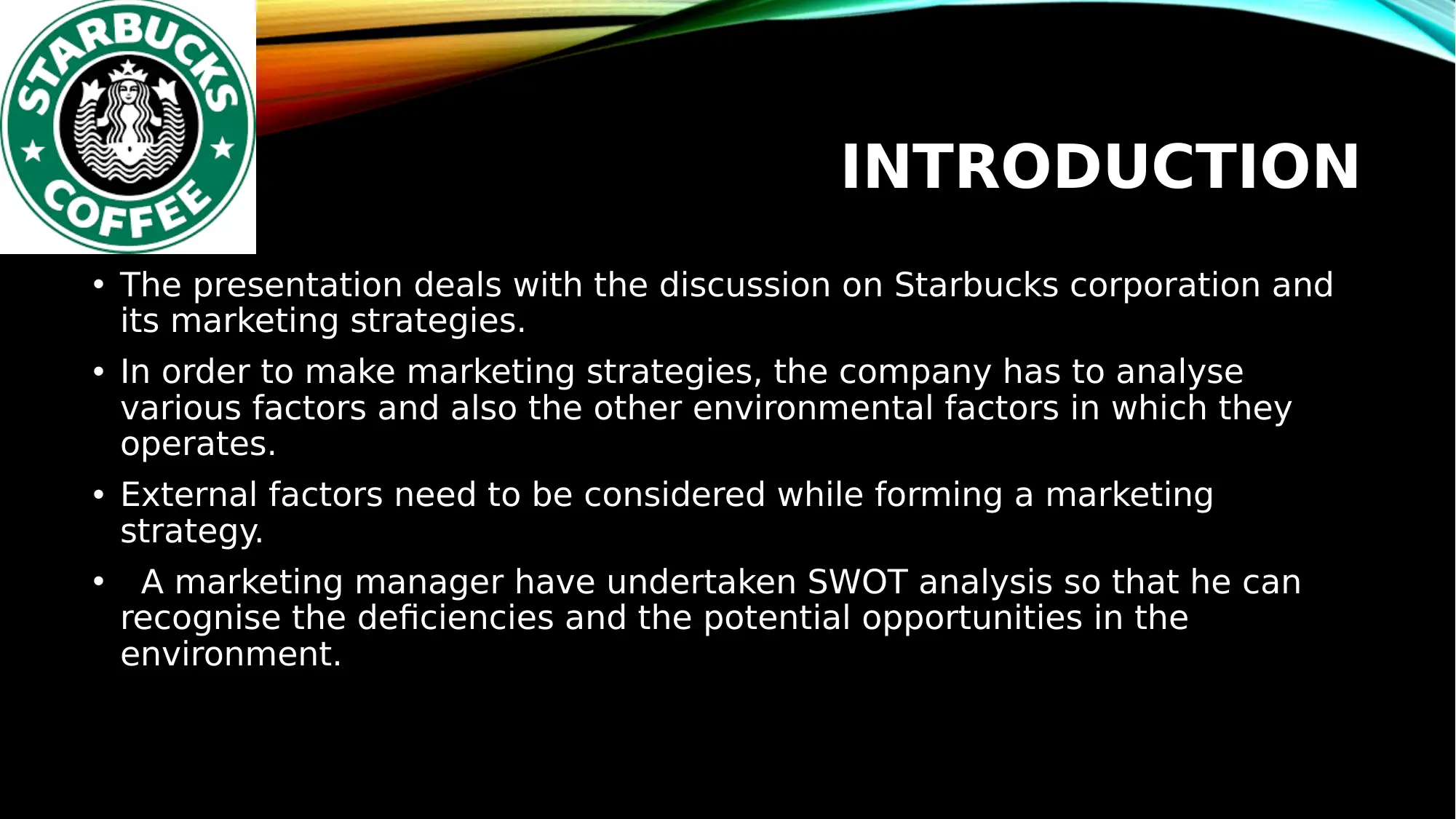
INTRODUCTION
• The presentation deals with the discussion on Starbucks corporation and
its marketing strategies.
• In order to make marketing strategies, the company has to analyse
various factors and also the other environmental factors in which they
operates.
• External factors need to be considered while forming a marketing
strategy.
• A marketing manager have undertaken SWOT analysis so that he can
recognise the deficiencies and the potential opportunities in the
environment.
• The presentation deals with the discussion on Starbucks corporation and
its marketing strategies.
• In order to make marketing strategies, the company has to analyse
various factors and also the other environmental factors in which they
operates.
• External factors need to be considered while forming a marketing
strategy.
• A marketing manager have undertaken SWOT analysis so that he can
recognise the deficiencies and the potential opportunities in the
environment.
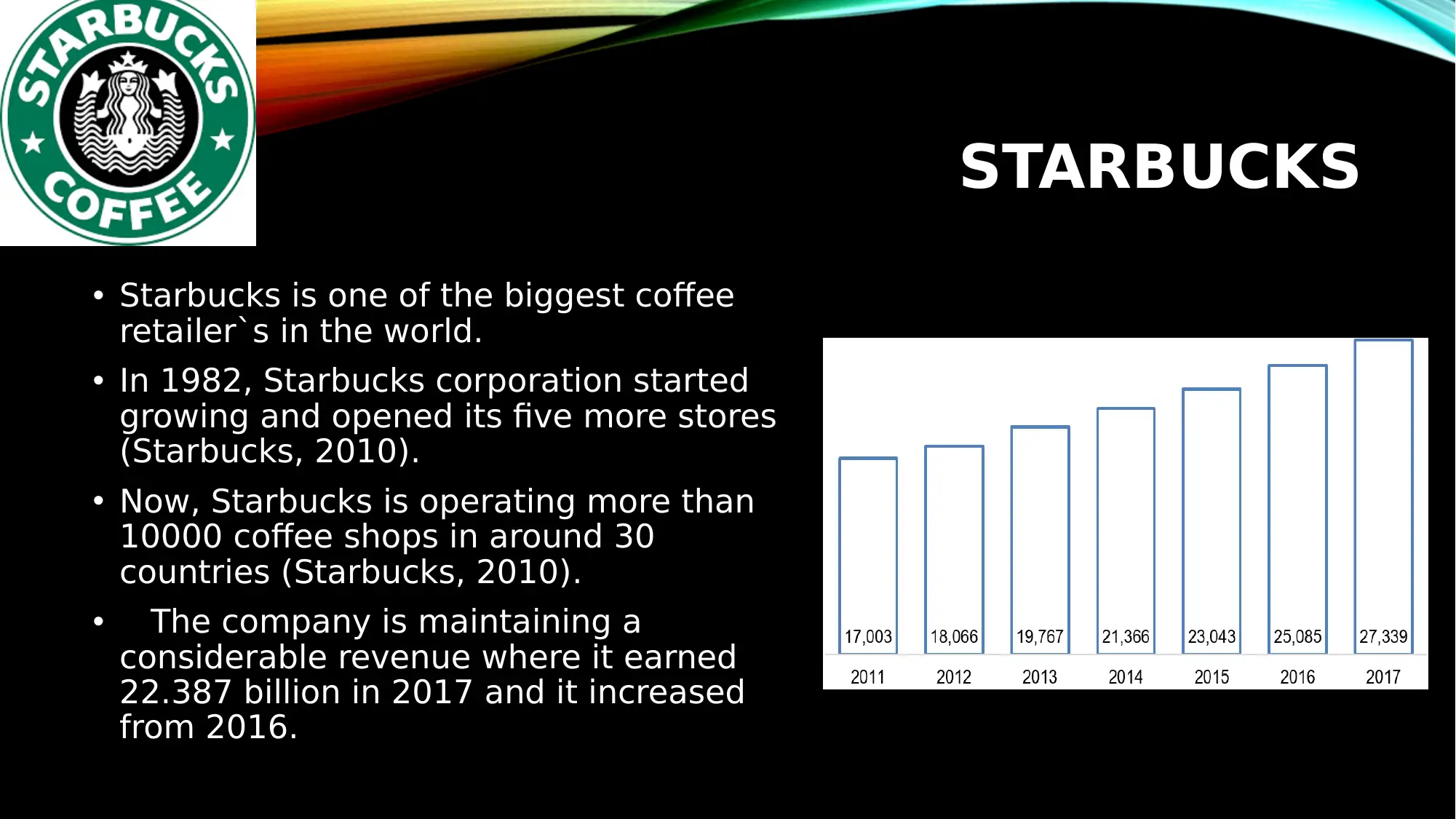
STARBUCKS
• Starbucks is one of the biggest coffee
retailer`s in the world.
• In 1982, Starbucks corporation started
growing and opened its five more stores
(Starbucks, 2010).
• Now, Starbucks is operating more than
10000 coffee shops in around 30
countries (Starbucks, 2010).
• The company is maintaining a
considerable revenue where it earned
22.387 billion in 2017 and it increased
from 2016.
• Starbucks is one of the biggest coffee
retailer`s in the world.
• In 1982, Starbucks corporation started
growing and opened its five more stores
(Starbucks, 2010).
• Now, Starbucks is operating more than
10000 coffee shops in around 30
countries (Starbucks, 2010).
• The company is maintaining a
considerable revenue where it earned
22.387 billion in 2017 and it increased
from 2016.
⊘ This is a preview!⊘
Do you want full access?
Subscribe today to unlock all pages.

Trusted by 1+ million students worldwide
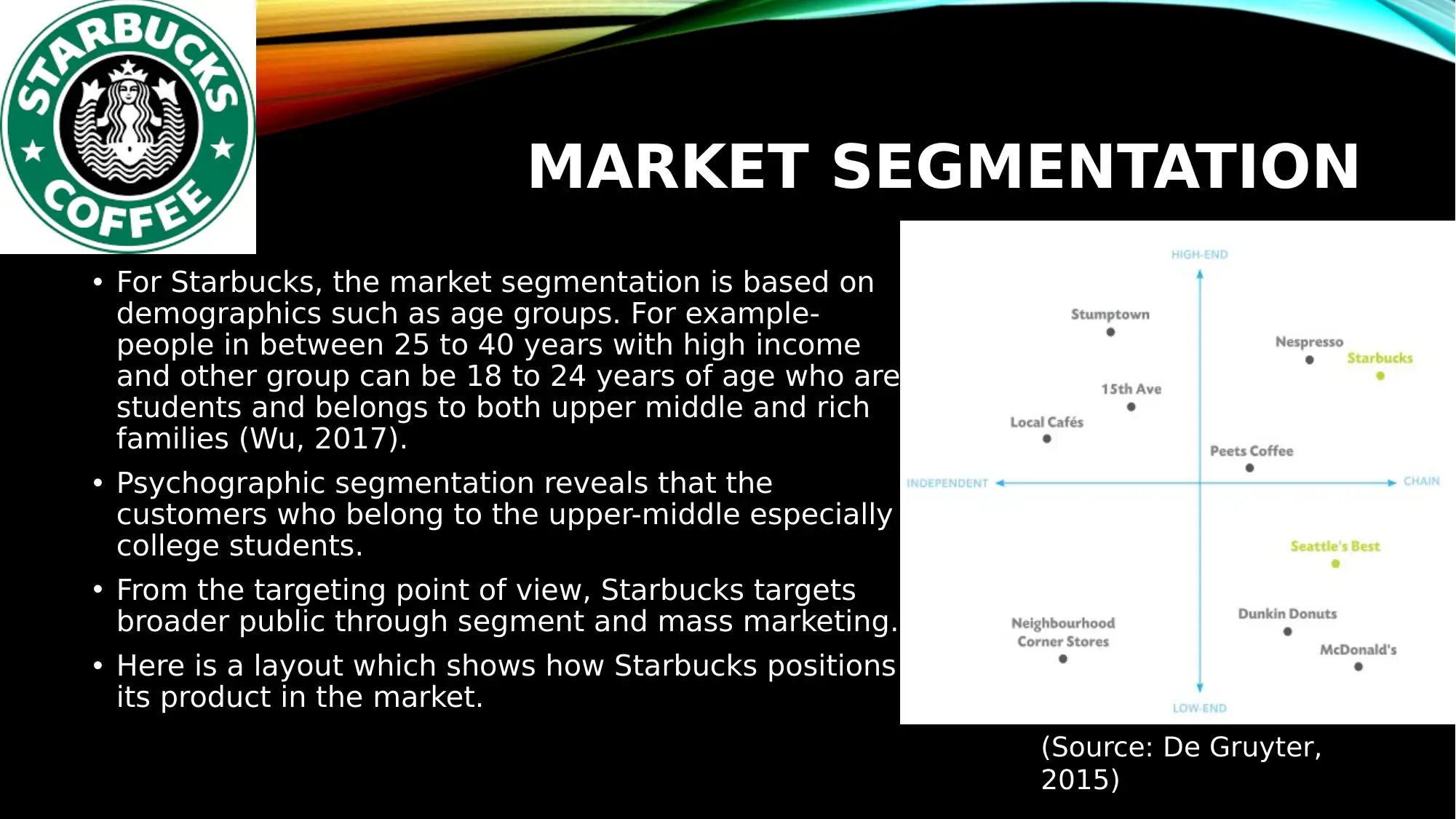
MARKET SEGMENTATION
• For Starbucks, the market segmentation is based on
demographics such as age groups. For example-
people in between 25 to 40 years with high income
and other group can be 18 to 24 years of age who are
students and belongs to both upper middle and rich
families (Wu, 2017).
• Psychographic segmentation reveals that the
customers who belong to the upper-middle especially
college students.
• From the targeting point of view, Starbucks targets
broader public through segment and mass marketing.
• Here is a layout which shows how Starbucks positions
its product in the market.
(Source: De Gruyter,
2015)
• For Starbucks, the market segmentation is based on
demographics such as age groups. For example-
people in between 25 to 40 years with high income
and other group can be 18 to 24 years of age who are
students and belongs to both upper middle and rich
families (Wu, 2017).
• Psychographic segmentation reveals that the
customers who belong to the upper-middle especially
college students.
• From the targeting point of view, Starbucks targets
broader public through segment and mass marketing.
• Here is a layout which shows how Starbucks positions
its product in the market.
(Source: De Gruyter,
2015)
Paraphrase This Document
Need a fresh take? Get an instant paraphrase of this document with our AI Paraphraser
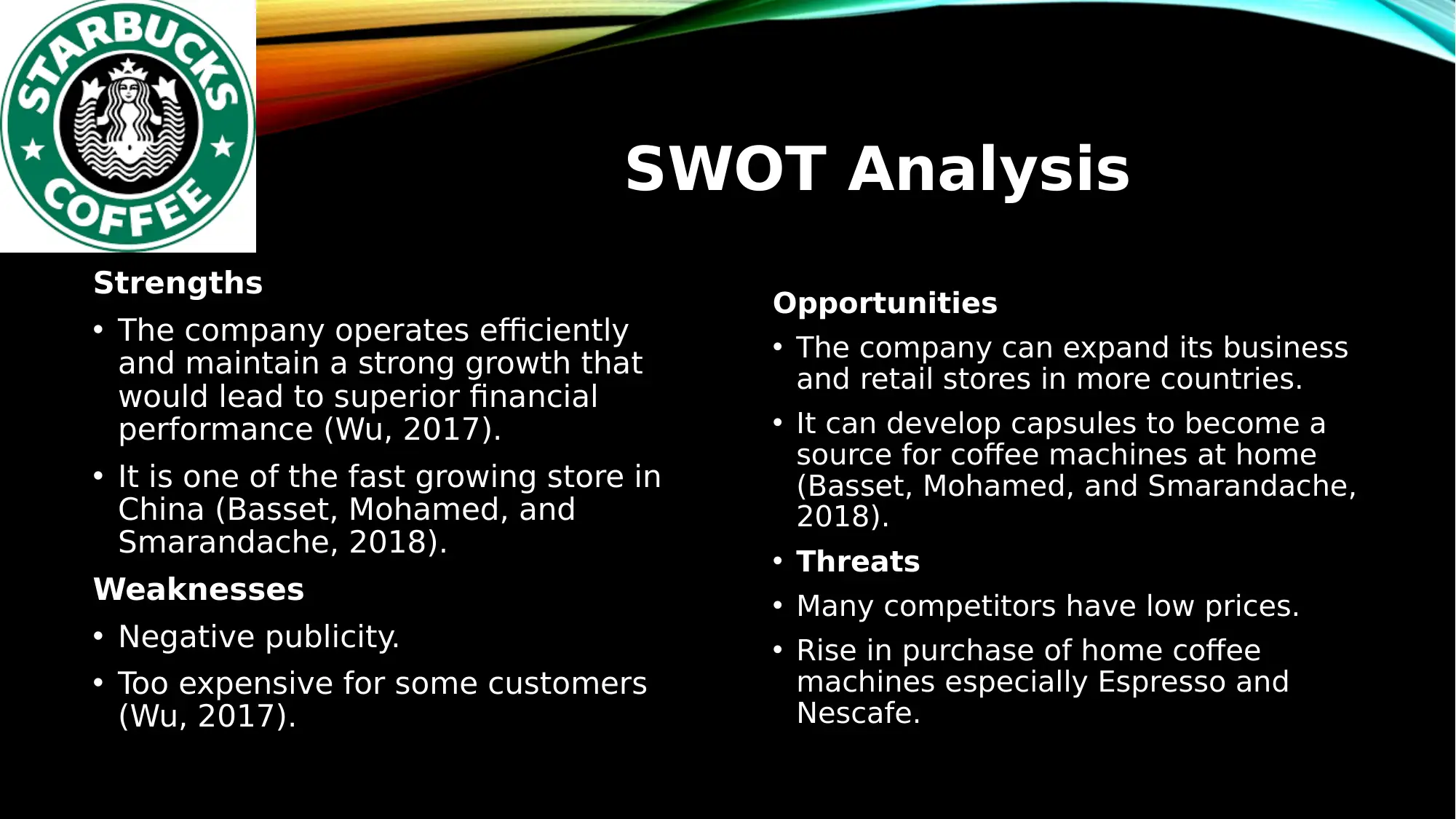
Strengths
• The company operates efficiently
and maintain a strong growth that
would lead to superior financial
performance (Wu, 2017).
• It is one of the fast growing store in
China (Basset, Mohamed, and
Smarandache, 2018).
Weaknesses
• Negative publicity.
• Too expensive for some customers
(Wu, 2017).
SWOT Analysis
Opportunities
• The company can expand its business
and retail stores in more countries.
• It can develop capsules to become a
source for coffee machines at home
(Basset, Mohamed, and Smarandache,
2018).
• Threats
• Many competitors have low prices.
• Rise in purchase of home coffee
machines especially Espresso and
Nescafe.
• The company operates efficiently
and maintain a strong growth that
would lead to superior financial
performance (Wu, 2017).
• It is one of the fast growing store in
China (Basset, Mohamed, and
Smarandache, 2018).
Weaknesses
• Negative publicity.
• Too expensive for some customers
(Wu, 2017).
SWOT Analysis
Opportunities
• The company can expand its business
and retail stores in more countries.
• It can develop capsules to become a
source for coffee machines at home
(Basset, Mohamed, and Smarandache,
2018).
• Threats
• Many competitors have low prices.
• Rise in purchase of home coffee
machines especially Espresso and
Nescafe.
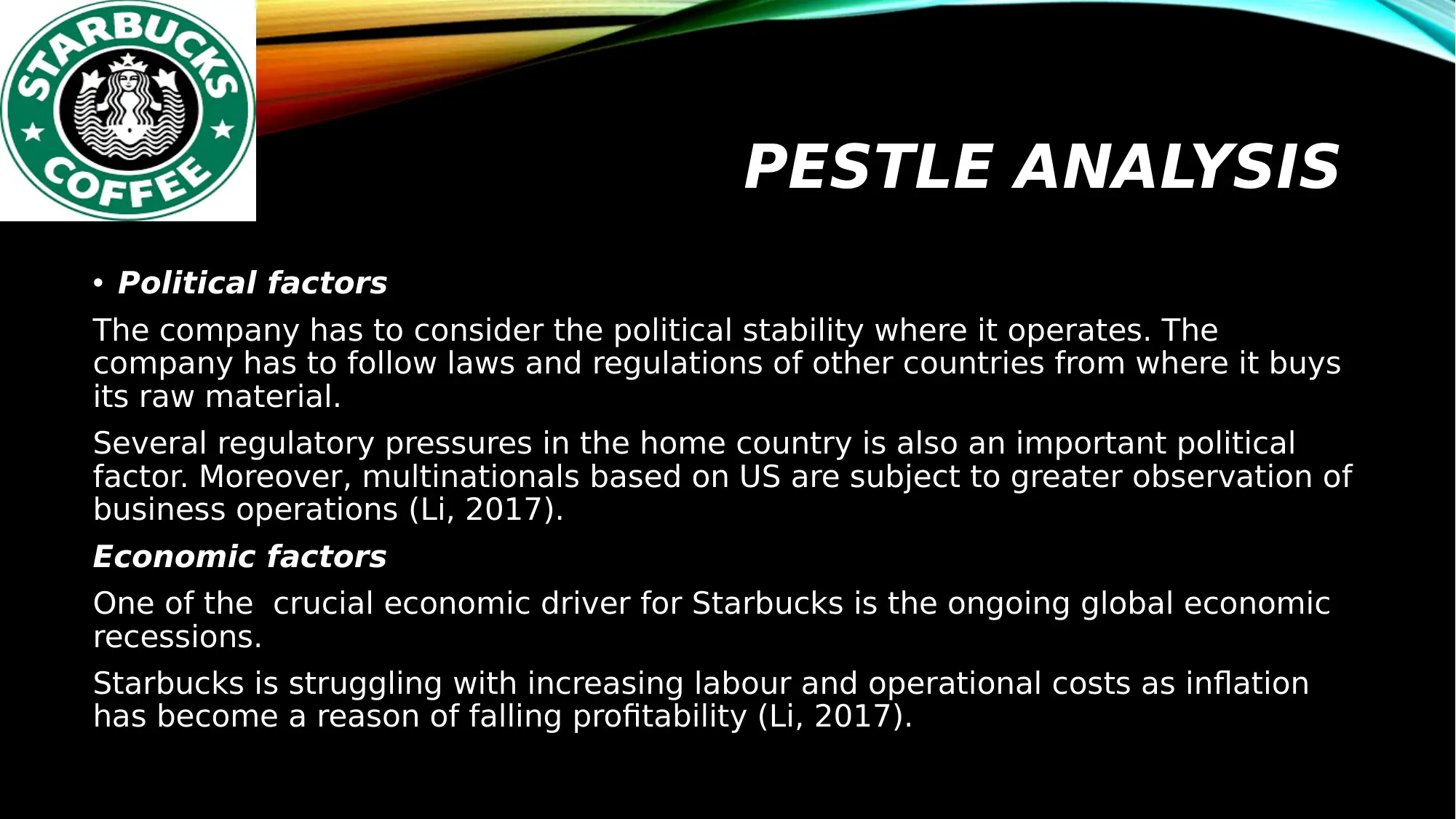
PESTLE ANALYSIS
• Political factors
The company has to consider the political stability where it operates. The
company has to follow laws and regulations of other countries from where it buys
its raw material.
Several regulatory pressures in the home country is also an important political
factor. Moreover, multinationals based on US are subject to greater observation of
business operations (Li, 2017).
Economic factors
One of the crucial economic driver for Starbucks is the ongoing global economic
recessions.
Starbucks is struggling with increasing labour and operational costs as inflation
has become a reason of falling profitability (Li, 2017).
• Political factors
The company has to consider the political stability where it operates. The
company has to follow laws and regulations of other countries from where it buys
its raw material.
Several regulatory pressures in the home country is also an important political
factor. Moreover, multinationals based on US are subject to greater observation of
business operations (Li, 2017).
Economic factors
One of the crucial economic driver for Starbucks is the ongoing global economic
recessions.
Starbucks is struggling with increasing labour and operational costs as inflation
has become a reason of falling profitability (Li, 2017).
⊘ This is a preview!⊘
Do you want full access?
Subscribe today to unlock all pages.

Trusted by 1+ million students worldwide
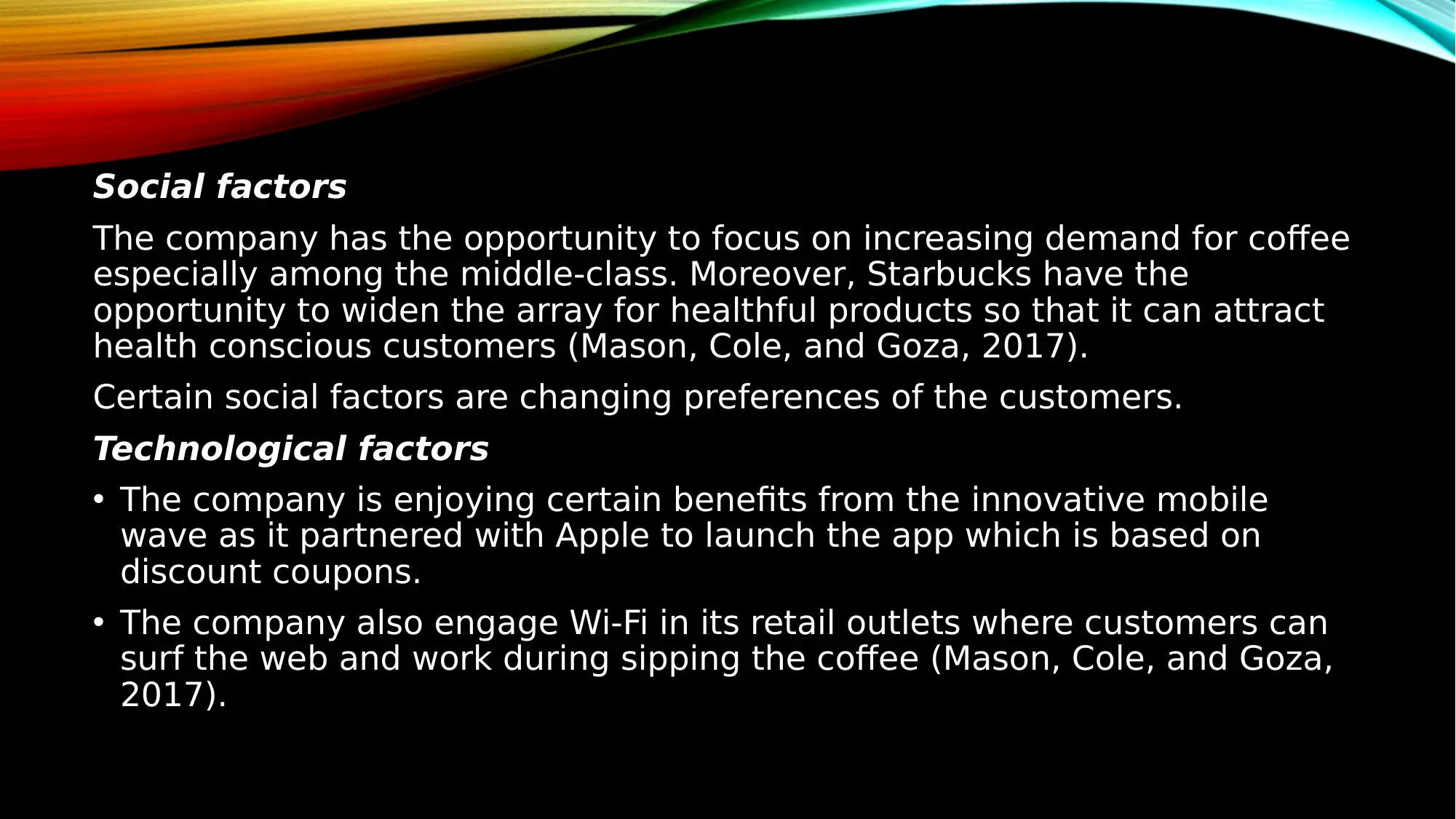
Social factors
The company has the opportunity to focus on increasing demand for coffee
especially among the middle-class. Moreover, Starbucks have the
opportunity to widen the array for healthful products so that it can attract
health conscious customers (Mason, Cole, and Goza, 2017).
Certain social factors are changing preferences of the customers.
Technological factors
• The company is enjoying certain benefits from the innovative mobile
wave as it partnered with Apple to launch the app which is based on
discount coupons.
• The company also engage Wi-Fi in its retail outlets where customers can
surf the web and work during sipping the coffee (Mason, Cole, and Goza,
2017).
The company has the opportunity to focus on increasing demand for coffee
especially among the middle-class. Moreover, Starbucks have the
opportunity to widen the array for healthful products so that it can attract
health conscious customers (Mason, Cole, and Goza, 2017).
Certain social factors are changing preferences of the customers.
Technological factors
• The company is enjoying certain benefits from the innovative mobile
wave as it partnered with Apple to launch the app which is based on
discount coupons.
• The company also engage Wi-Fi in its retail outlets where customers can
surf the web and work during sipping the coffee (Mason, Cole, and Goza,
2017).
Paraphrase This Document
Need a fresh take? Get an instant paraphrase of this document with our AI Paraphraser
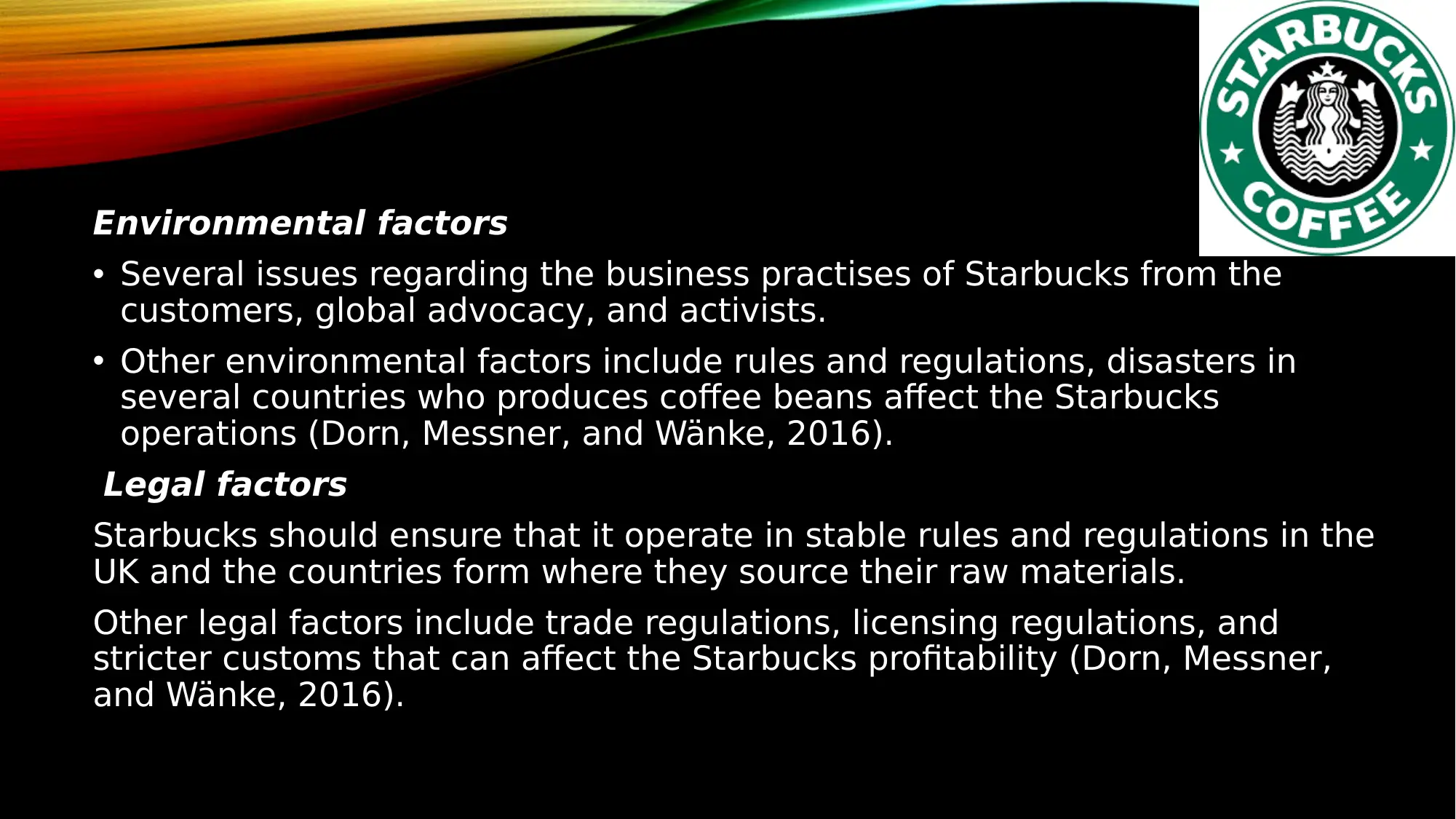
Environmental factors
• Several issues regarding the business practises of Starbucks from the
customers, global advocacy, and activists.
• Other environmental factors include rules and regulations, disasters in
several countries who produces coffee beans affect the Starbucks
operations (Dorn, Messner, and Wänke, 2016).
Legal factors
Starbucks should ensure that it operate in stable rules and regulations in the
UK and the countries form where they source their raw materials.
Other legal factors include trade regulations, licensing regulations, and
stricter customs that can affect the Starbucks profitability (Dorn, Messner,
and Wänke, 2016).
• Several issues regarding the business practises of Starbucks from the
customers, global advocacy, and activists.
• Other environmental factors include rules and regulations, disasters in
several countries who produces coffee beans affect the Starbucks
operations (Dorn, Messner, and Wänke, 2016).
Legal factors
Starbucks should ensure that it operate in stable rules and regulations in the
UK and the countries form where they source their raw materials.
Other legal factors include trade regulations, licensing regulations, and
stricter customs that can affect the Starbucks profitability (Dorn, Messner,
and Wänke, 2016).
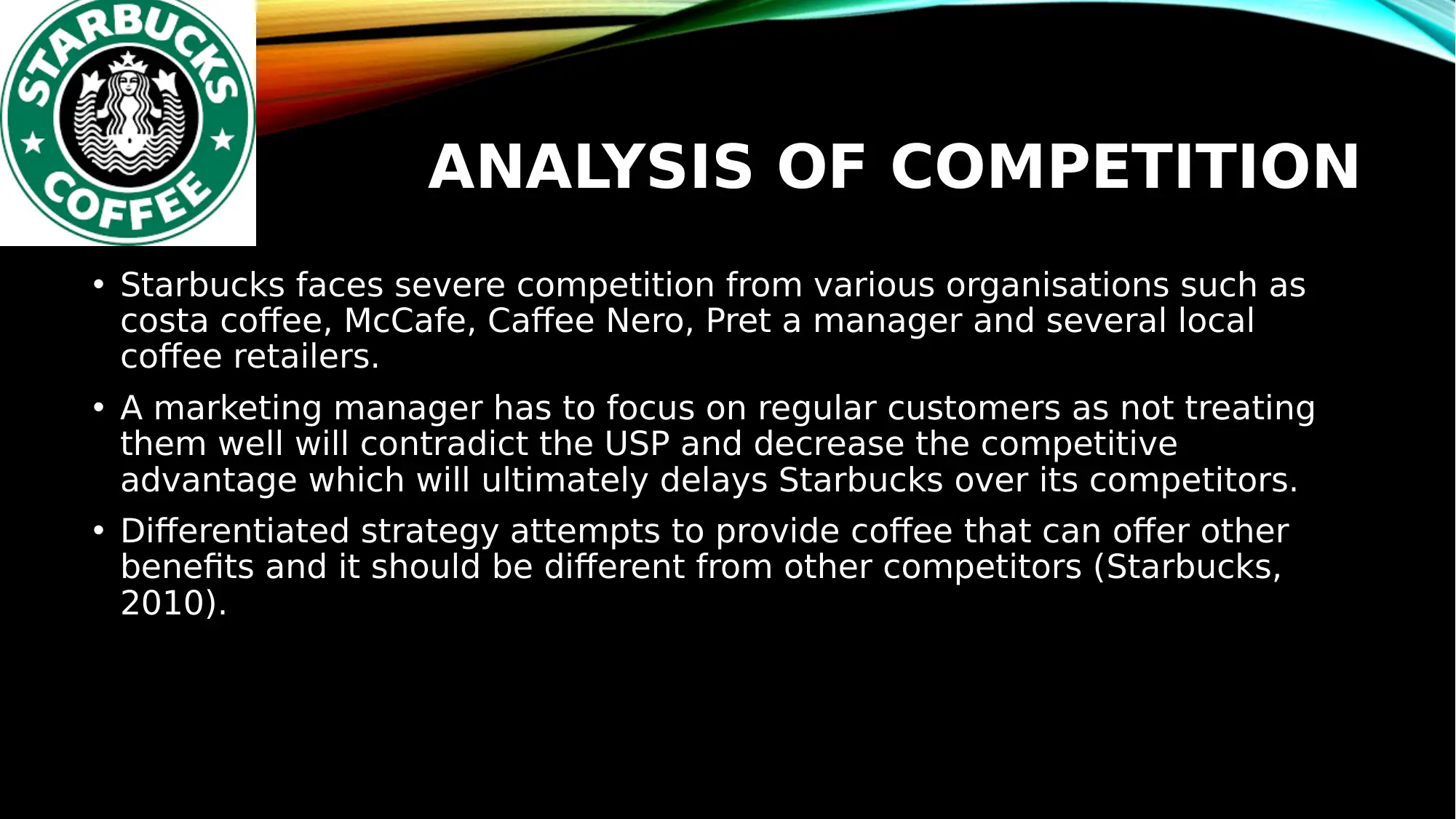
ANALYSIS OF COMPETITION
• Starbucks faces severe competition from various organisations such as
costa coffee, McCafe, Caffee Nero, Pret a manager and several local
coffee retailers.
• A marketing manager has to focus on regular customers as not treating
them well will contradict the USP and decrease the competitive
advantage which will ultimately delays Starbucks over its competitors.
• Differentiated strategy attempts to provide coffee that can offer other
benefits and it should be different from other competitors (Starbucks,
2010).
• Starbucks faces severe competition from various organisations such as
costa coffee, McCafe, Caffee Nero, Pret a manager and several local
coffee retailers.
• A marketing manager has to focus on regular customers as not treating
them well will contradict the USP and decrease the competitive
advantage which will ultimately delays Starbucks over its competitors.
• Differentiated strategy attempts to provide coffee that can offer other
benefits and it should be different from other competitors (Starbucks,
2010).
⊘ This is a preview!⊘
Do you want full access?
Subscribe today to unlock all pages.

Trusted by 1+ million students worldwide
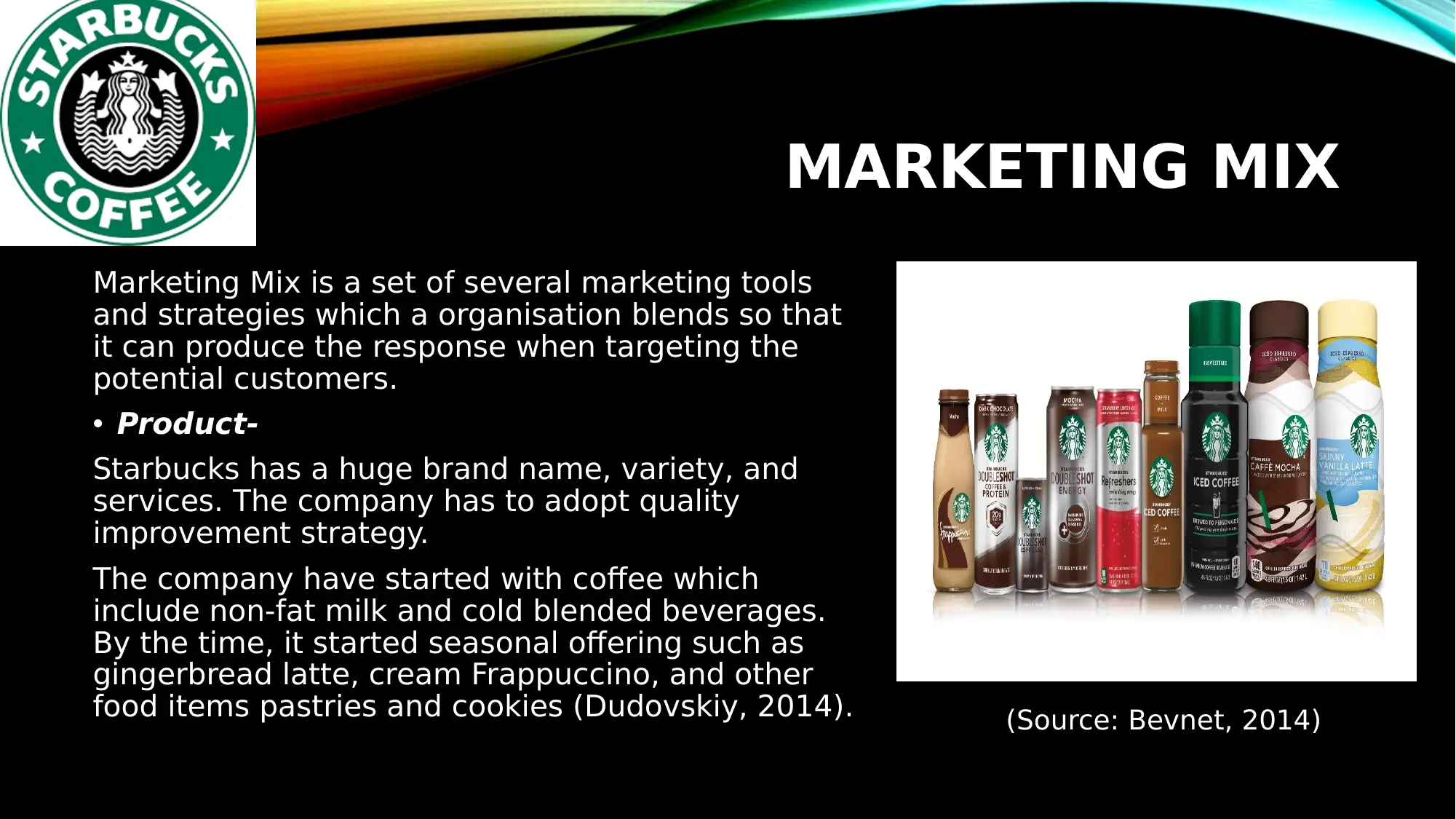
MARKETING MIX
Marketing Mix is a set of several marketing tools
and strategies which a organisation blends so that
it can produce the response when targeting the
potential customers.
• Product-
Starbucks has a huge brand name, variety, and
services. The company has to adopt quality
improvement strategy.
The company have started with coffee which
include non-fat milk and cold blended beverages.
By the time, it started seasonal offering such as
gingerbread latte, cream Frappuccino, and other
food items pastries and cookies (Dudovskiy, 2014). (Source: Bevnet, 2014)
Marketing Mix is a set of several marketing tools
and strategies which a organisation blends so that
it can produce the response when targeting the
potential customers.
• Product-
Starbucks has a huge brand name, variety, and
services. The company has to adopt quality
improvement strategy.
The company have started with coffee which
include non-fat milk and cold blended beverages.
By the time, it started seasonal offering such as
gingerbread latte, cream Frappuccino, and other
food items pastries and cookies (Dudovskiy, 2014). (Source: Bevnet, 2014)
Paraphrase This Document
Need a fresh take? Get an instant paraphrase of this document with our AI Paraphraser
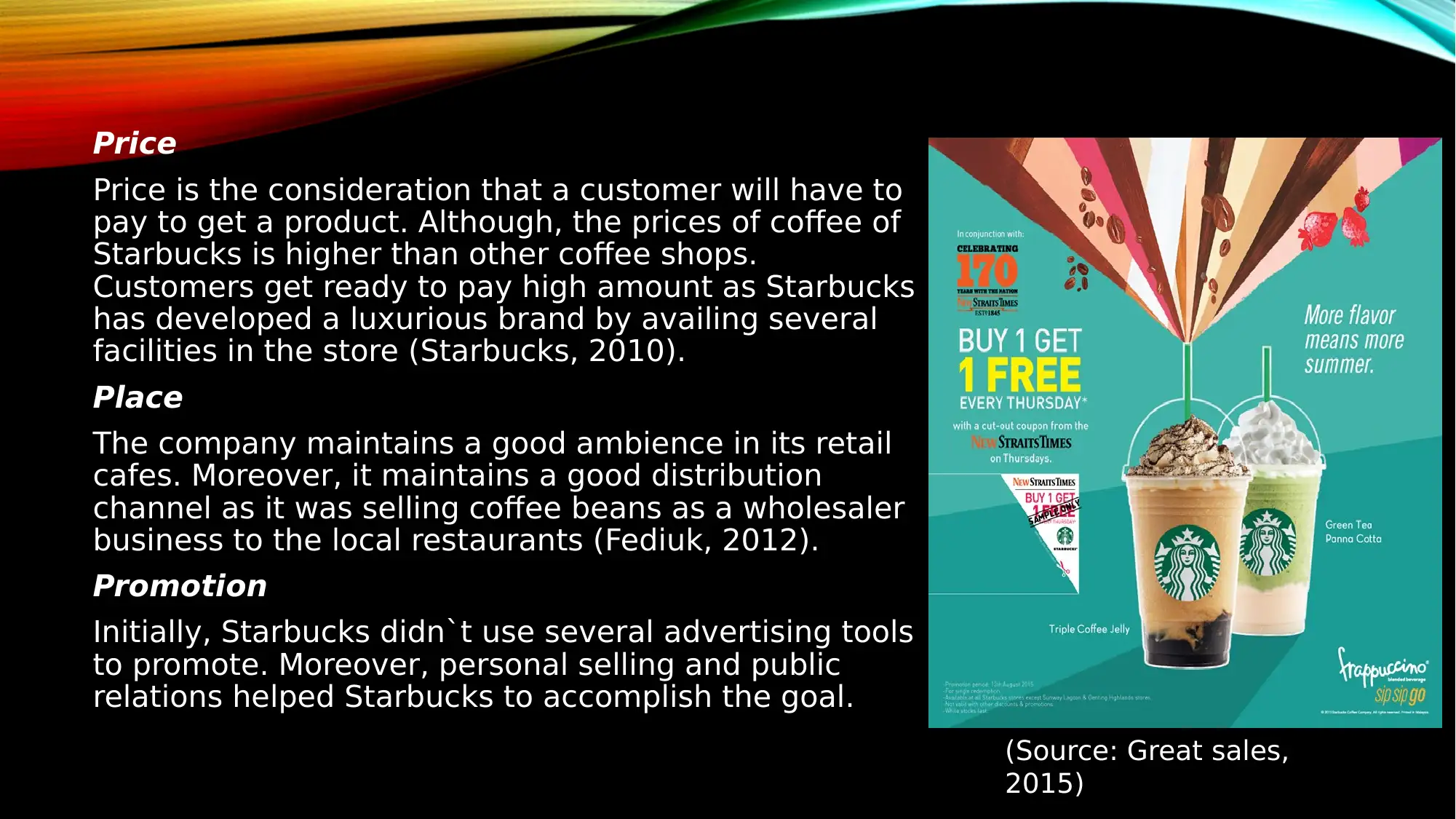
Price
Price is the consideration that a customer will have to
pay to get a product. Although, the prices of coffee of
Starbucks is higher than other coffee shops.
Customers get ready to pay high amount as Starbucks
has developed a luxurious brand by availing several
facilities in the store (Starbucks, 2010).
Place
The company maintains a good ambience in its retail
cafes. Moreover, it maintains a good distribution
channel as it was selling coffee beans as a wholesaler
business to the local restaurants (Fediuk, 2012).
Promotion
Initially, Starbucks didn`t use several advertising tools
to promote. Moreover, personal selling and public
relations helped Starbucks to accomplish the goal.
(Source: Great sales,
2015)
Price is the consideration that a customer will have to
pay to get a product. Although, the prices of coffee of
Starbucks is higher than other coffee shops.
Customers get ready to pay high amount as Starbucks
has developed a luxurious brand by availing several
facilities in the store (Starbucks, 2010).
Place
The company maintains a good ambience in its retail
cafes. Moreover, it maintains a good distribution
channel as it was selling coffee beans as a wholesaler
business to the local restaurants (Fediuk, 2012).
Promotion
Initially, Starbucks didn`t use several advertising tools
to promote. Moreover, personal selling and public
relations helped Starbucks to accomplish the goal.
(Source: Great sales,
2015)
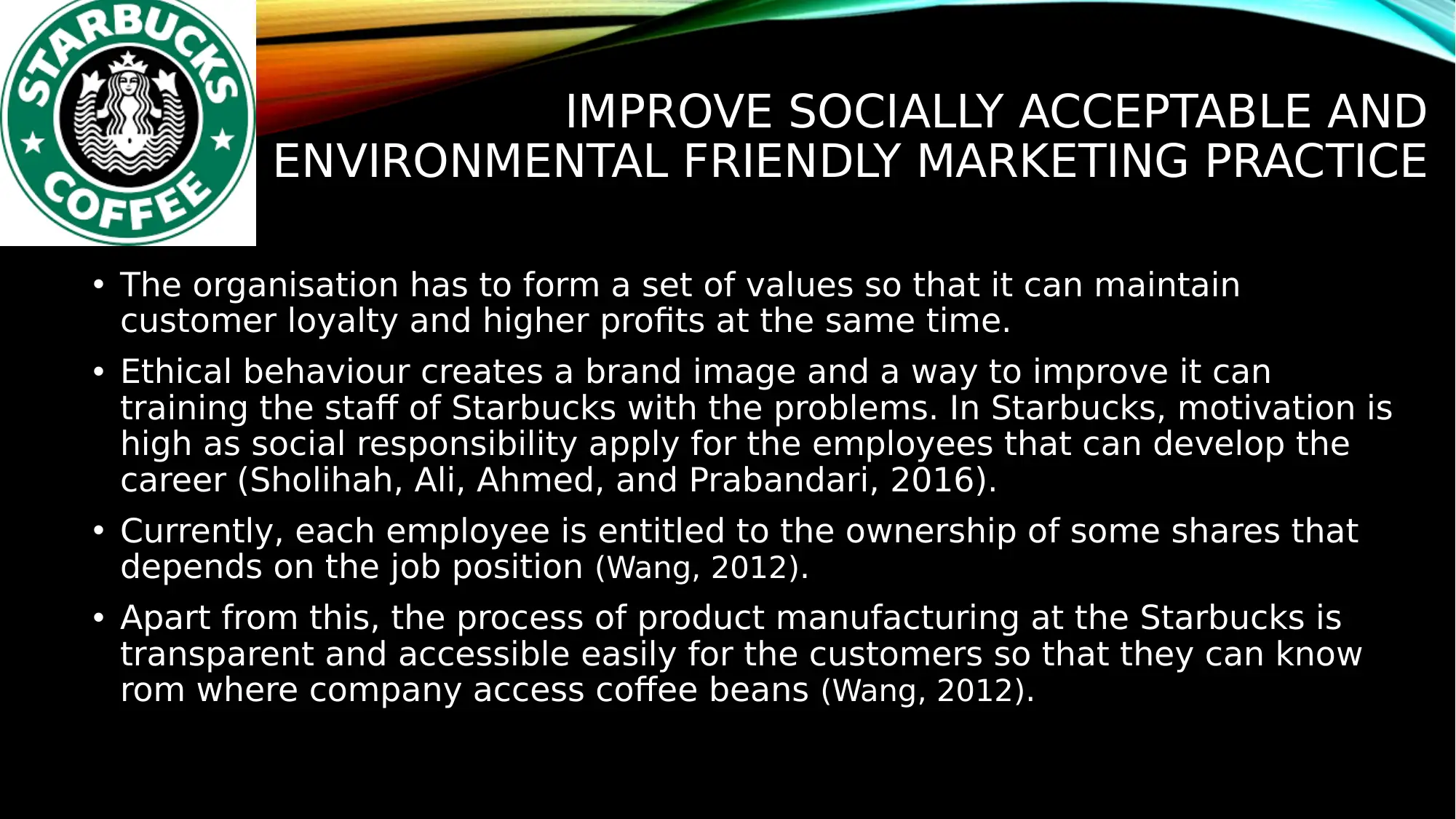
IMPROVE SOCIALLY ACCEPTABLE AND
ENVIRONMENTAL FRIENDLY MARKETING PRACTICE
• The organisation has to form a set of values so that it can maintain
customer loyalty and higher profits at the same time.
• Ethical behaviour creates a brand image and a way to improve it can
training the staff of Starbucks with the problems. In Starbucks, motivation is
high as social responsibility apply for the employees that can develop the
career (Sholihah, Ali, Ahmed, and Prabandari, 2016).
• Currently, each employee is entitled to the ownership of some shares that
depends on the job position (Wang, 2012).
• Apart from this, the process of product manufacturing at the Starbucks is
transparent and accessible easily for the customers so that they can know
rom where company access coffee beans (Wang, 2012).
ENVIRONMENTAL FRIENDLY MARKETING PRACTICE
• The organisation has to form a set of values so that it can maintain
customer loyalty and higher profits at the same time.
• Ethical behaviour creates a brand image and a way to improve it can
training the staff of Starbucks with the problems. In Starbucks, motivation is
high as social responsibility apply for the employees that can develop the
career (Sholihah, Ali, Ahmed, and Prabandari, 2016).
• Currently, each employee is entitled to the ownership of some shares that
depends on the job position (Wang, 2012).
• Apart from this, the process of product manufacturing at the Starbucks is
transparent and accessible easily for the customers so that they can know
rom where company access coffee beans (Wang, 2012).
⊘ This is a preview!⊘
Do you want full access?
Subscribe today to unlock all pages.

Trusted by 1+ million students worldwide
1 out of 16
Related Documents
Your All-in-One AI-Powered Toolkit for Academic Success.
+13062052269
info@desklib.com
Available 24*7 on WhatsApp / Email
![[object Object]](/_next/static/media/star-bottom.7253800d.svg)
Unlock your academic potential
Copyright © 2020–2026 A2Z Services. All Rights Reserved. Developed and managed by ZUCOL.




